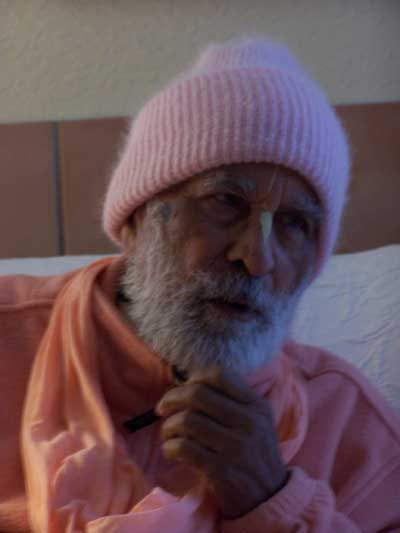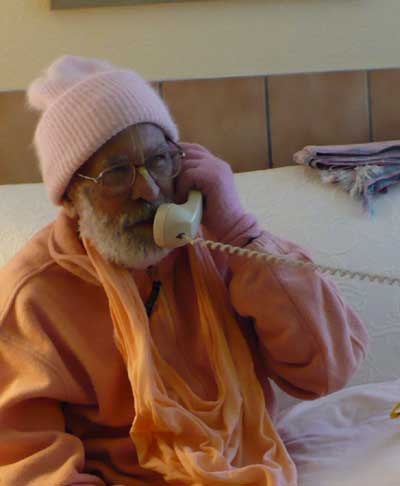|
Tridandisvami Sri Srimad Bhaktivedanta
Narayana Maharaja
After the Morning Walk San Francisco, California: June 13, 2007  [Sripad Sajjan Maharaja:] One of my god-brothers has a sentimental relationship with another god-brother and accepts him as a siksa-guru. He is in saffron cloth. His siksa-guru wants him to put on white cloth and engage in business and get married. He is worried that he will have to give up being a brahmacari. He is now attracted to your teachings. I heard that if the guru tells you to get married, you can reject his order. Is this true? Or, would the bona fide guru never give this instruction? [Srila Narayana Maharaja:] Why is that guru saying this? If he were a bona fide guru, he would not say this. He would say this only if he were not bona fide. Reject him. [Sripad Sajjan Maharaja:] Now this devotee is rejecting his siksa-guru and accepting you. [Srila Narayana Maharaja:] Why would a bona fide guru say, Oh, you are a brahmacari; you should get married? No bona-fide guru has done this. Has Srila Swami Maharaja told this? No; and I would never tell this. *(See endnote) The bona-fide guru laments for that disciple, thinking, I warned him, but still he married. Our estimation of him will be diminished. Understand? If a person is engaged in Krsnas service and hearing sweet pastimes of Krsna the life history of Prahlada Maharaja, the glories of Hanuman, the Pandavas, and Uddhava, and superior to him, the gopis he should be able to give up material life forever, as Srila Raghunatha dasa Gosvami, Srila Rupa Gosvami, Srila Sanatana Gosvami, and Srila Gopala Bhatta Gosvami have done. We should follow them. We inspire disciples to give up worldly life and come here, and they do the opposite. They take sannyasa and again marry. If we actually preach the mission of our guru-parampara, we cannot deviate. If you are chanting, but not preaching and not hearing hari-katha from superiors, you must become weak. [Bhagavat dasa:] In Badger 2004, you said that even if someone is worshipping one hundred salagrama-silas every day, but he has no taste for hearing hari-katha, then he will go down. [Srila Narayana Maharaja:] Yes, he will distribute his salagramas. [Sripad Srauti Maharaja:] You said it is like cutting a tree and giving water to the different parts. Then nothing will happen. [Srila Narayana Maharaja:] yatha taror mula-nisecanena trpyanti tat-skandha-bhujopasakhah pranopaharac ca yathendriyanam tathaiva sarvarhanam acyutejya [As pouring water on the root of a tree energizes the trunk, branches, twigs and everything else, and as supplying food to the stomach enlivens the senses and limbs of the body, simply worshiping the Supreme Personality of Godhead through devotional service automatically satisfies the demigods, who are parts of that Supreme Personality. (Srimad-Bhagavatam, 4.31.14)] If you give water to the leaves and flowers of a tree, but not to the root, the leaves and flowers must die. If you give water only to the root of the tree, the leaves and flowers everywhere will be watered. If you give water to both the roots and flowers, the flowers will rot. If you give food to your mouth and also to your eyes, what will happen? It is better to put food in the mouth and not in any other part of the body. [Bhagavat dasa:] But Krsna can eat with His eyes. [Srila Narayana Maharaja:] This has been told about the jivas (we living beings of this world). It has been said in the Vedic scriptures that Acyuta (a name of Sri Krsna meaning infallible) is the root of the entire world. If you please, worship, and serve Krsna, then the entire world is benefited. [Speaking with Krsna-devi didi from Italy, who has just called on the phone:]  Hare Krsna. My heartly blessings to you, your daughter, and your sons. I was just asking your husband about you. I think you are translating one of my books now? You should preach and translate books. Your daughter is okay? What is she doing now? I want to come again to Italy and have a hari-katha festival there on the lake. It is very beautiful there. I have just told your prabhu (husband) to arrange this, and we may come in the summer-time. When your prabhu returns, discuss this with each other and make a plan. [Srila Narayana Maharaja to Sripad Srauti Maharaja:] You should preach boldly. When you give class, think that those in the audience are like dry trees. Think that they do not know anything. Then you can speak; otherwise, you cannot (you will be too shy). [* Endnote Brahmacari, the Homonym From the beginning of the Krsna consciousness movement in the West in the 1960s and 1970s, there was no real brahmachari asrama in Iskcon. Srila Prabhupada had to gradually bring a very fallen material society to the point where the people in general could follow varnasrama dharma. He did the miraculous feat of sing-handedly introducing varnasrama dharma. He gave saffron cloth to a man or boy from his very first day in the temple. He wanted to encourage and strengthen the newcomers in Vedic living, and he wanted to give society at large some semblance of a practical conception of varnasrama (wherein young boys from all walks of life would live for some years in the asrama of the guru, be trained in brahmacari life, and then decide when he would become of marriageable age whether he would remain brahmacari or become a householder). Most of Srila Prabhupadas male and female followers were living together or with many lovers in immorality. He wanted to bring them to a civilized life of marriage, and to help them to become Krsna conscious in their married asrama, and therefore he introduced the system of brahmacari training at first. The standard of the brahmacari in Iskcon is different from the traditional Gaudiya Matha standards. In traditional Gaudiya Matha practices, one wears white cloth until one desires to become a full time or permanent resident of the Matha (temple). Only after some time (some years) is he given saffron, when the spiritual master sees that he understands the real meaning of bhakti, and detachment from the world is manifesting in his heart. At that time he takes a vow never to marry and to remain celibate. This is the standard of brahmacari which Srila Narayana Maharaja is referring to, and Srila Prabhupada would never approve of such a brahmacari marrying. ed. (based on Srila Prabhupadas books, conversations, and lectures) Editorial Advisors: Pujyapad Madhava Maharaja, Sripad Brajanath dasa and Sri Prema Prayojana dasa Editor: Syamarani dasi Transcriber: Vasanti dasi Typist: Anita dasi Proofreader: Krsna-kamini dasi
|
After the Morning Walk - June 13, 2007
- Details





